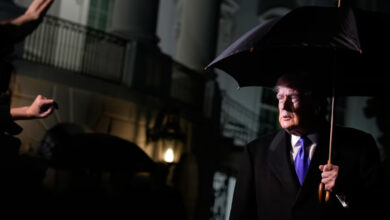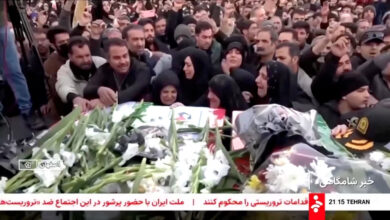
Prime Minister Benjamin Netanyahu took aim at Iran in his speech to more than 190 nations in the UN General Assembly, but the Israeli leader was clearly tailoring his message for one man: President Donald Trump.
With the US President hinting that he may pull out of the deal to constrain Tehran’s nuclear program against the wishes of other countries that signed onto the agreement, Netanyahu used his annual address to argue that the world should reconsider the pact and echoed Trump in calling it “an embarrassment.”
Netanyahu “had an audience of one,” said David Makovsky, a distinguished fellow at the Washington Institute for Near East Policy. “He sees a chance to somehow either jettison the agreement or more vigorously enforce it. And that could be where they end up.”
US law requires the president to certify to Congress every three months whether Iran is meeting its end of the bargain, which curbed Tehran’s nuclear program in exchange for the lifting of economic sanctions.
Trump and US officials have said that even though the International Atomic Energy Agency has said that Iran is complying, they believe that Iran is in violation of the “spirit” of the deal.
Indeed, Trump has seemed to suggest that he may not certify Iran’s compliance with the nuclear agreement in October, the next deadline, for this reason.
Secretary of State Rex Tillerson fleshed out administration thinking in London on September 14 saying that the preface of the Joint Comprehensive Plan of Action, as the deal is called, “reads that the participants, quote, ‘anticipate that full implementation of this JCPOA will positively contribute to regional and international peace and security,’ end quote.”
Iran’s regional mischief
While the preface just “anticipates” that the deal will lead to greater peace and security, it doesn’t actually require any signatory to commit to that goal. Even so, critics of the pact, including Netanyahu, have seized on Iran’s activities in the region as a reason to abrogate the agreement.
They point to Iran’s support for Houthi rebels in Yemen, for the regime of Bashar al-Assad in Syria, which has slaughtered its own citizens, as well as Tehran’s support for groups that foment violence and terror across the Middle East. The money flowing to Iran because of sanctions relief is funding these activities and more, the deal’s critics argue.
US and European officials involved in the negotiations say that if it had encompassed too many aspects of Iran’s behavior, an agreement would never have been reached. Iran’s support for terrorism and its missile development don’t go unpunished, they argue, pointing out that that Iran’s activities are targeted by numerous UN, US and other sanctions.
Even so, Netanyahu drilled down on Iran’s malfeasance in his remarks to the UN and on his flattery of Trump.
“I’ve listened to countless speeches in this hall, none were bolder, none were more courageous than the one delivered President Trump today,” Netanyahu said, reminding the audience that he was once Israel’s ambassador to the world body.
“Here at the UN we must also speak the truth about Iran as President Trump did so powerfully this morning,” he said.
Netanyahu was following up on a one-on-one Monday meeting he had with the President, where he told Trump that he looked “forward to discussing with you how we can address together what you rightly call the terrible nuclear deal with Iran and how to roll back Iran’s growing aggression in the region, especially in Syria.”
On Tuesday, Trump addressed the General Assembly a few hours before Netanyahu took the podium and told the audience that the 2015 international agreement is “one of the worst and most one-sided transactions the United States has ever entered into. Frankly, that deal is an embarrassment to the United States, and I don’t think you’ve heard the last of it — believe me.”
Sunsets and ‘a dark shadow’
Trump and US officials also echo Netanyahu in their criticism of sunset provisions in the deal, which allow Iran to resume some nuclear-related activities after a few years.
“When that sunset comes, a dark shadow will be cast over the Middle East and the world because Iran will then be free to enrich uranium on an industrial scale,” Netanyahu warned Tuesday.
“The Iranian nuclear deal not only doesn’t block Iran’s path to the bomb, but actually paves it,” he said.
The Israeli prime minister said that Iran “vows to destroy my country every day,” but took pains to stress that the threat he sees is not just to his country. Iran is developing ballistic missiles “to threaten the entire world,” he said and in the meantime, is wreaking havoc in his region.
“From the Caspian Sea to the Mediterranean, Tehran to Tartus, an Iranian curtain is descending across the Middle East,” Netanyahu said.




